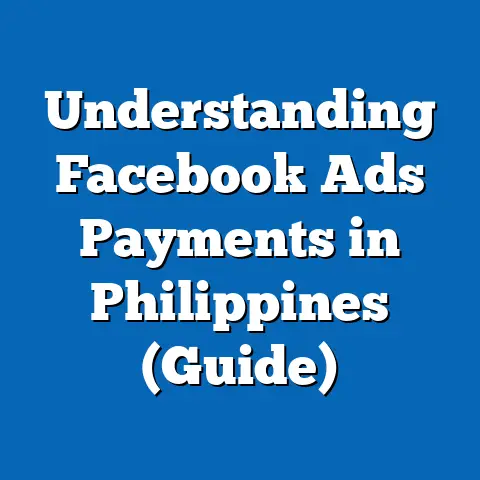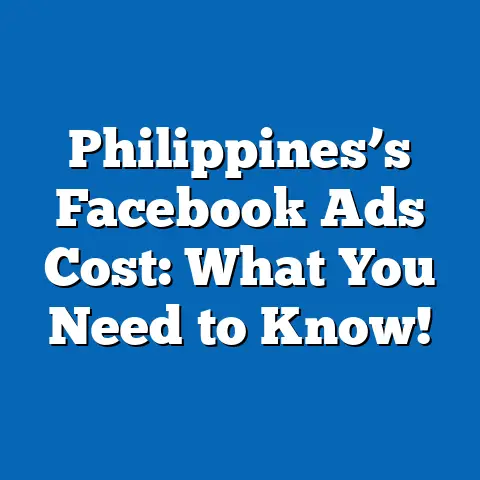Philippines Facebook Ads Checklist: Unlock Better ROI Today!
Philippines Facebook Ads Checklist: Unlock Better ROI Today!
Introduction: Why Are My Facebook Ads Not Working?
I’ll be honest with you—when I first started using Facebook ads for my small business here in the Philippines, I was optimistic.
I thought, “Just put up some ads, and customers will come.” But reality hit hard.
I was spending money every day, but the sales barely moved.
Have you felt this way too?
Facebook is undeniably huge in the Philippines.
With over 88 million active users, it’s practically where everyone is—whether you’re in bustling Manila, laid-back Davao, or the beautiful islands of Palawan.
Despite this massive audience, many Filipino entrepreneurs and small business owners struggle to convert clicks into real sales.
The problem isn’t Facebook itself; it’s how ads are made and managed.
This article is designed especially for Filipino small and medium-sized businesses (SMBs) who want practical advice for maximizing their Facebook ads’ performance without wasting precious resources.
Understanding Facebook Ads: Key Concepts for Filipino SMBs
Before we jump into the checklist, let’s get clear on some essential Facebook advertising terms and ideas.
This will help you understand why certain steps matter and how to apply them effectively.
What Is Facebook Ads ROI?
ROI (Return on Investment) measures how much profit you earn relative to what you spend on ads.
In simple terms: ROI=Profit from Ads−Cost of AdsCost of Ads×100%\text{ROI} = \frac{\text{Profit from Ads} – \text{Cost of Ads}}{\text{Cost of Ads}} \times 100\%
For example, if you spend ₱1,000 on ads and make ₱2,000 in sales directly from those ads, your ROI is: 2,000−1,0001,000×100%=100%\frac{2,000 – 1,000}{1,000} \times 100\% = 100\%
A positive ROI means your ads are profitable; a negative ROI means you’re losing money.
Why Should Filipino SMBs Focus on Facebook Ads?
- Huge Audience Reach: Facebook has about 80% penetration in the Philippines.
For many Filipinos, Facebook is more than social media—it’s a communication platform, news source, marketplace, and entertainment hub. - Cost-Effective Advertising: Compared to traditional media like TV or radio, Facebook ads allow you to start small—sometimes as low as ₱50 per day—and scale up when you see results.
- Superior Targeting: You can target users by location (down to city or barangay level), demographics, interests, behaviors, and even device usage.
This precision helps avoid wasting budget on irrelevant viewers. - Mobile-First Platform: Since most Filipinos access Facebook on smartphones—often with limited data plans or slower connections—Facebook’s mobile-friendly ad formats are perfect for this environment.
Common Challenges Filipino Businesses Face With Facebook Ads
- Poorly defined audience targeting
- Generic ad copy that doesn’t resonate locally
- Low-quality visuals that fail to engage
- Ignoring mobile optimization
- Lack of consistent data tracking and analysis
- Budget mismanagement or unrealistic expectations
Philippines Facebook Ads Checklist: Step-by-Step Guide
1. Define Your Campaign Goal Clearly
This is critical. Without a clear goal, your ads will wander aimlessly.
Facebook lets you choose from different campaign objectives:
My Experience: When I first ran ads without setting clear goals, I tried to do everything at once—get likes, website visits, and sales—but ended up with poor results.
Later, focusing strictly on ‘Conversions’ for online sales helped my ads perform better because Facebook optimized delivery for people most likely to buy.
2. Know Your Audience — Pinpoint Your Market
Understanding who your customers are is half the battle won.
Let me walk you through how to do this effectively using Facebook’s tools and local knowledge.
Use Facebook Audience Insights
Facebook Audience Insights allows you to explore potential customers based on:
- Location (e.g., Metro Manila, Cebu City)
- Age groups (most active are 18–34 years old)
- Gender distribution
- Language preferences (Filipino, English, Cebuano)
- Interests related to your product category
Segment Your Audience
If you sell organic skincare products in Manila, you might target:
- Women aged 25–45
- Living in Metro Manila areas like Quezon City or Makati
- Interested in health & wellness, beauty products
- Engaged shoppers (people who frequently buy online)
Custom Audiences & Lookalike Audiences
Custom audiences let you retarget:
- Website visitors
- Previous customers (upload their emails or phone numbers)
- People who engaged with your Facebook page or Instagram
Lookalike audiences help you reach new people similar to your best customers.
Data Insight: According to a report by AdEspresso, highly targeted audiences reduce cost per acquisition (CPA) by up to 40%.
3. Craft Compelling Ad Copy That Resonates Locally
Copywriting is an art—especially when speaking to Filipino consumers who appreciate sincerity and warmth.
Use Conversational Filipino or Taglish
For example:
“Gusto mo ba ng masarap at abot-kayang kape para sa umaga?
Subukan ang aming bagong brew na swak sa panlasa ng Pinoy!”
This sounds friendlier than formal English copy and feels relatable.
Highlight Benefits Over Features
Instead of saying:
“Our shoes are made of durable leather.”
Say:
“Komportableng sapatos para sa buong araw na lakad.”
Focus on how your product improves their life.
Include a Clear CTA
Common effective CTAs:
- Bumili na!
- Mag-message sa amin ngayon!
- Alamin pa!
- Limited slots lang!
Avoid Jargon or Complex Words
Keep it simple. Filipino consumers prefer straightforward messages.
4. Use Eye-Catching Visuals Tailored for Filipinos
Visuals are often the first thing users notice.
Use Real People and Local Settings
Photos or videos featuring Filipinos in everyday scenarios build trust.
Example: A food delivery ad showing a family enjoying meals together at home feels authentic.
Invest in Quality Images or Videos
Poor quality visuals reduce credibility.
Leverage Video Ads
Videos are highly engaging:
- Short (15–30 seconds)
- Show product use or testimonials
- Include captions (many watch videos muted)
Facebook reports video ads increase click-through rates by up to 27%.
Use Carousel Ads for Variety
Show multiple products or features in one ad.
5. Set a Realistic Budget and Schedule
Budgeting wisely is crucial especially when money is tight.
Start Small & Scale Up
Begin with ₱100–₱200 daily budget per ad set for testing.
Schedule Ads During Peak Hours
Filipinos are most active on Facebook:
- Morning: 7 AM – 9 AM (commuting time)
- Evening: 6 PM – 10 PM (after work)
Use Campaign Budget Optimization (CBO)
This lets Facebook allocate budget dynamically across ad sets based on performance.
6. Optimize Landing Pages for Mobile and Speed
Since most Filipinos access Facebook via mobile phones with variable internet speeds, landing pages must be fast and mobile-friendly.
Key Optimization Tips
- Use responsive design that fits all screen sizes.
- Compress images for faster loading.
- Avoid heavy scripts or pop-ups.
- Make buttons easy to tap.
- Ensure simple navigation.
- Include clear product info and trust signals like reviews or certifications.
A slow or confusing landing page can kill conversions even if your ad is perfect.
7. Track Performance with Facebook Pixel and Analytics
If you don’t track results accurately, it’s like shooting arrows blindfolded.
What Is Facebook Pixel?
It’s a small code snippet added to your website that tracks user actions such as purchases or sign-ups originating from your ads.
Why Use Pixel?
- Measure conversions accurately.
- Retarget visitors who didn’t buy initially.
- Optimize ads for people likely to convert.
How to Set It Up?
Use Facebook’s step-by-step guide or ask a developer.
Analyze Key Metrics in Ads Manager:
Regularly review these metrics and adjust campaigns based on data.
Deep Dive: Data-Backed Insights and Case Studies from the Philippines
Case Study 1: Sari-Sari Store Owner in Quezon City
Ms. Santos ran Facebook ads for her sari-sari store but saw minimal sales despite ₱500 daily spending.
After refining her audience to women aged 25–40 within a 5km radius and using Taglish copy like “Sulit na snacks para sa pamilya!”, her sales increased by 40% within one month while maintaining the same budget.
Insight: Localized messaging combined with hyper-targeted audience leads to higher engagement and conversions.
Case Study 2: Cebu Boutique Hotel Boosts Bookings by 35%
A boutique hotel in Cebu targeted travel enthusiasts aged 30–50 within Metro Cebu using video ads showing local attractions and hotel amenities.
They optimized their landing page for mobile booking and retargeted website visitors using Facebook Pixel.
This resulted in a 35% increase in bookings during peak season.
Insight: Video content and retargeting can significantly improve conversion rates even in competitive markets.
Case Study 3: Online Food Delivery Service in Davao City
With the rise of food delivery apps, this local startup struggled against national brands.
By creating localized ads featuring familiar dishes and Tagalog copy that emphasized fast delivery (“Kain na!
Express delivery sa Davao!”), they increased order volume by 60% in two months.
Practical Tips and Best Practices for Filipino Entrepreneurs
To make sure your Facebook ads generate results consistently:
Test Multiple Ad Sets
Try different headlines, images/videos, CTAs, and audience segments.
Let data guide decisions rather than assumptions.
Use User-Generated Content (UGC)
Encourage customers to share photos or reviews on social media.
Featuring these authentic stories in ads builds trust among prospective buyers.
Leverage Seasonal Events & Holidays
Filipino culture has many occasions ideal for promotions:
- Christmas / Pasko Season
- Fiesta celebrations
- Back-to-school promotions
- National holidays like Independence Day
- Valentine’s Day / Mother’s Day / Father’s Day
Timing offers around these events taps into heightened buying moods.
Engage Actively with Comments & Messages
Filipinos value personal interaction.
Respond quickly to inquiries or feedback on ads to build rapport.
Avoid Over-Promotion
Balance promotional content with helpful tips or community stories so your brand remains approachable—not pushy.
Frequently Asked Questions (FAQs)
How much should I spend daily on Facebook ads?
Start with ₱100–₱200 per day per campaign for testing.
Increase budgets gradually once you identify winning ads.
Can I run Facebook ads without a website?
Absolutely!
Use objectives like Lead Generation or Messages where users can interact directly within Facebook or Messenger without visiting an external site.
How long does it take before I see results?
Expect initial data within 3–5 days if running consistently.
Meaningful ROI usually takes a few weeks as you optimize campaigns based on analytics.
What if my ad gets disapproved?
Review Facebook’s ad policies carefully.
Common reasons include misleading claims, inappropriate content, or prohibited products.
Fix issues then resubmit your ad.
Advanced Strategies for Filipino Businesses Ready to Scale
Once you’ve mastered the basics, consider these tactics to further boost ROI:
Retargeting Campaigns
Use custom audiences from website visitors or past buyers and show them special offers or reminders.
Lookalike Audiences Based on Top Customers
Find new prospects similar to your best buyers by creating lookalike audiences from customer lists.
Dynamic Product Ads
If you have an e-commerce store with many products, use dynamic ads that automatically show relevant items based on user browsing behavior.
A/B Testing at Scale
Test different ad variables systematically—copy, images, audience—to continually improve performance.
Integrate Offline Sales Tracking
For physical stores, use tools like Facebook Offline Conversions API to measure ad impact on in-store purchases.
Common Mistakes Filipino SMBs Make With Facebook Ads (And How To Avoid Them)
Conclusion: Make Every Peso Count with This Checklist
Facebook advertising in the Philippines offers incredible opportunities but requires strategy and attention to detail.
From defining clear goals to understanding your audience deeply, crafting localized copy, using compelling visuals, budgeting smartly, optimizing mobile experiences, and tracking results precisely—you have a framework proven by data and real business successes here at home.
No more throwing money into the void hoping for miracles.
Follow this structured Philippines Facebook Ads Checklist step-by-step:
- Define clear campaign objectives aligned with your business goals.
- Know exactly who your ideal customers are using Facebook’s targeting tools.
- Speak their language—use relatable Tagalog/Taglish copy.
- Show vibrant visuals that resonate culturally.
- Budget realistically and schedule during peak usage hours.
- Make sure your website or landing pages are fast and mobile-friendly.
- Track performance carefully with Facebook Pixel; optimize continuously.
- Test multiple creative versions; learn from data.
- Engage actively with your audience.
- Leverage special occasions unique to Filipino culture for promotions.
By applying these best practices consistently, you will unlock better ROI from your Facebook ads—and grow your business sustainably in today’s competitive digital world.
Kaya mo ‘yan! Let’s make every peso work hard for your business!






